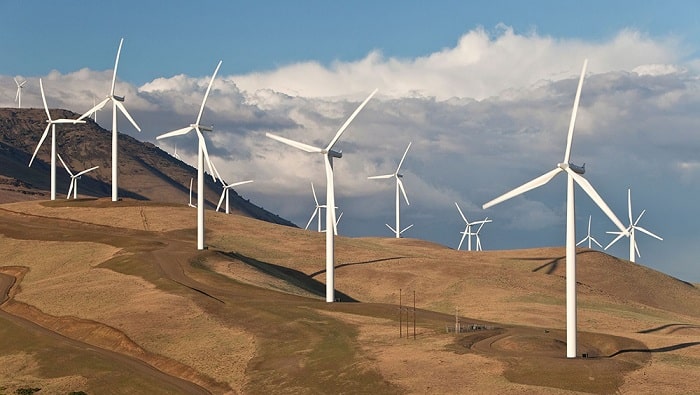Masdar signed a power purchase agreement with the government of Uzbekistan to design, finance, build and operate a 500 megawatt, utility-scale wind project.
The wind farm will be built in the in the Zarafshon district of the Navoi region and commercial operations are targeted to start in 2024. Masdar did not disclose the total investment in the project.
“The wind farm supports Uzbekistan’s long-term renewable energy ambitions and its strong commitment to not only modernise its power sector, but also invest in energy security,” Mohamed Jameel Al Ramahi, chief executive of Masdar said.
This is the second project for Masdar in the central Asian republic. In November last year, it signed an agreement to develop the country’s first public-private partnership solar power plant in the Navoi region with a total investment of $100 million (Dh367m). Masdar submitted the lowest bid of 2.679
US cents per kilowatt hour in the programme’s competitive auction to win the 100 megawatt capacity project. “Masdar is our long-term trusted partner in expanding our renewable energy capacities and bringing their well-known international expertise to the country,” said Uzbekistan’s deputy prime minister Sardor Umurzakov.
Uzbekistan is aiming to develop 5 gigawatts of renewable energy by 2030.
Masdar, fully owned by Mubadala Investment Company, is a major player in the renewable energy sector across the globe. The power generating capacity of renewable energy projects in which Masdar is a partner exceeds 5 gigawatts, representing a combined investment of approximately $14.3 billion spanning more than 30 countries.
Earlier this year, Masdar signed a deal in neighbouring Azerbaijan to develop, build and operate a 200 megawatt solar PV project located 75 kilometres southwest of Baku.
The company also agreed to develop its first venture in South-East Asia – a 145 megawatt floating solar photovoltaic plant for Indonesia’s state electricity company, Perusahaan Listrik Negara.
Masdar is also aiming to expand its operations in Africa.
The company agreed to establish a joint venture with Egypt’s Infinity Energy to develop renewable energy projects. The new firm, named Infinity Power, will develop utility-scale solar and wind power projects for clean energy generation across Africa.
Renewable energy projects are gaining traction across the world as costs reduce due to advancements in technology. Around half of renewable energy capacity added in 2019 was cheaper than the least expensive coal plants, according to the International Renewable Energy Agency.
Solar photovoltaic energy saw the steepest declines in cost between 2010 and 2019, declining 82 per cent, while concentrated solar power fell 47 per cent, according to Irena.
The cost of deploying wind projects also fell during this period, with onshore wind declining 47 per cent, while offshore wind energy schemes were 29 per cent cheaper.





































